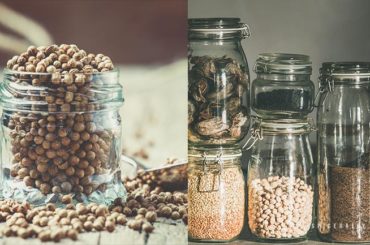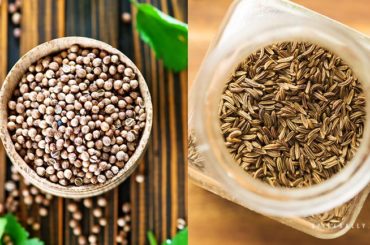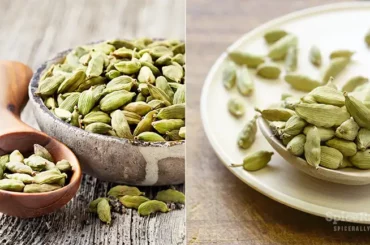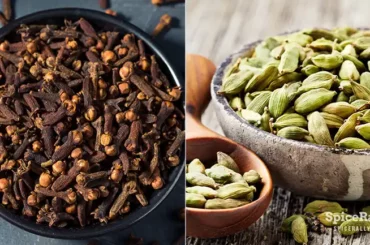Mulled wine and pumpkin pies must be among your seasonal non-negotiables, and did you know that cloves are one of their primary ingredients? So, here’s all you need to learn about this intense spice!
Cloves are the dried immature buds of the evergreen tree Syzygium aromaticum of the Myrtaceae family. This spice is recognized for its intense, spicy, warm, and subtly sweet flavor and aroma, along with its numerous health and non-culinary benefits. Cloves compliments a wide variety of savory, sweet dishes and beverages. It is often used in its whole or ground forms in cooking.
If cloves lie in your spice cabinet at the moment or you hope to add this spice to your collection, this article will dive deep into all ins and outs of this aromatic culinary companion. Keep reading!
What Are Cloves? Are They A Spice Or A Herb?
The small, reddish-brown, pin-like aromatics or deep brown, fragrant powder that lies inside your spice cabinet actually comes from the evergreen Syzygium aromaticum tree, popularly known as the clove tree. Cloves are known as one of the strongest and oldest spices in the world. The tiny whole cloves or powdered cloves are this tree’s immature, dried, unopened flower buds.
The clove tree belongs to the Myrtaceae botanical family and is native to North Moluccas Islands (The Spice Islands) in Indonesia. Dried whole cloves are brown, hard, and resemble the shape of a small nail or a pin. The name “cloves” is known to be derived from the Latin term for nails, which is “clavus”.

This spice is popular around the world for its robust flavor and aroma in cooking and baking. Cloves also contain various other non-culinary uses, including health, beauty, and household benefits. Whole cloves and ground or powdered cloves are widely used in sweet, savory, and beverage preparation, preservation, flavoring, along with aromatizing.
Cloves are commercially harvested in Indonesia, Pakistan, India, and Sri Lanka, as well as in African countries such as Madagascar, the Comoro Islands, Tanzania, and Seychelles. Cloves are usually hand-picked, so it calls for some labor-intensive work. However, we can have this year-round spice thanks to the different harvesting seasons across various countries.
Processing Of Cloves
Clove buds should be harvested before the violet, or crimson flowers develop. Clusters of flower buds are hand-picked from the branches and are separated from the stalks. The buds and stems are removed and dried individually, and the separated stems are usually used for oil distillation. Drying The buds must be done quickly, or they will activate fermenting. They are typically dried in the sun- scattered on clean carpets.
These drying clove buds should be turned and raked constantly to make sure they produce a consistent brown color. The color of the buds transforms from pale russet to a deeper brown as the cloves dry. This drying procedure takes about four to five days and cannot be accelerated, or the cloves will become dry, breakable, and shrunk rather than bulky.
The cloves are perfectly dried once the buds will snap effortlessly. During the rainy season, cloves are usually dried using an automatic drier such as a tray drier. The dried buds are sorted using a conventional winnowing basket to extract dust and other foreign matter. The sorted dried clove buds are packaged whole or sent to the grinding process.
How Do Cloves Taste And Smell Like?
Cloves are categorized as a warm culinary spice that has a characteristic piquant, spicy, sweet, and woodsy flavor with a slightly bitter and astringent mouthfeel. The taste of cloves is known to go a long way in your dishes, even with a little addition.
This is one of the most aromatic spices you could find among your cooking spices, with an intensely warm, spicy-sweet aroma. The characteristic flavor and aroma of cloves primarily come from the compound “eugenol,” which contains upwards of 85% of its essential oil composition.
How Spicy Are Cloves?
Cloves are treasured for their spiciness, and ground cloves offer a stronger hit of spiciness than the whole clove pods. The piquancy of this spice emphasizes when associated with other warm spices like cinnamon, nutmeg, mace, allspice, and ginger.
Forms Of Cloves
Cloves are widely available as whole pods and in their ground form. At the same time, this spice also comes as clove bud or clove leaf essential oil, clove extract, and concentrated clove capsules for different non-culinary purposes.
A Little Sneak-Peak To The History And Origin Of Cloves
Cloves, indeed, have a shining history! According to the sources, this spice was probably imported from the Moluccas Islands into China more than 2000 years ago. Cloves became progressively widespread in Europe from the 8th century, and the approach of this precious spice allowed the ambitious Venetians to become incredibly wealthy.
The enticement of cloves tempted the Portuguese to the Moluccas in 1514; the Dutch followed them in 1605, retaining authority over the business until late in the 18th century. However, the value of cloves as a flavor has dropped dramatically since the time of Magellan.
Nevertheless, despite Magellan’s fateful travel round, its freight of about 50 tons of cloves and nutmeg was deemed to have made the expedition a financial conquest. Cloves were among the most treasured items in Europe in the 16th and 17th centuries and were believed to be worth more than their weight in gold.
How To Use Cloves?
As one of the most iconic warming spices, cloves add an immense flavor and aroma to our dishes as whole buds, ground, or in the form of a liquid extract. Not only that, this spice is known for its therapeutic qualities and its many household uses.
Culinary Uses Of Cloves
This ingredient widely appears in savory and sweet foods and beverage preparations coming from Indian, Chinese, Sri Lankan, northern African, Middle Eastern, and Mexican cuisines.
Cloves are also an important spice that features in many seasonal goodies prepared in Western cuisine, particularly during fall and winter. Both whole and ground cloves get called in recipes hand in hand, while sometimes clove liquid extract is used in sweets, baked goods, drinks, and some savory preparations.
This spice pairs well with other ingredients, such as:
- Cinnamon
- Nutmeg
- Allspice
- Ginger
- Cardamom
- Mace
- Star anise
- Szechuan peppercorns
- Chiles
- Basil
- Rosemary
- Sage
- Thyme
- Citrus peel
- Apples, pears, pineapples, and berries
- Meat and seafood
- Carrots, beets, potatoes, tomatoes, squash, and onion
Culinary Uses Of Whole Cloves
Due to the epic intensity of the cloves, this spice is often used sparingly in cooking and baking. Whole cloves are primarily incorporated into liquids that require simmering. And they are usually removed from the dish before serving since biting into them can overpower the palate with the flavor, leaving a numbing sensation on the tongue.
In addition, whole cloves are also included as garnishing. The formation of cloves makes them a notably engaging and effective garnish traditionally added to hams. Most often, they are simply stuck into the surface of a ham to make it look more appealing. You can also stick cloves into fruits like apples or oranges so that they will be impressive to look at, and the flavor will also infuse into the fruit.
Click on this link to discover the best ways to use cloves in cooking and baking.
Whole cloves are also a key ingredient in most spicy curries made in Indian and Sri Lankan cuisines. They usually give a slight pound on the clove buds along with other spices such as cinnamon and cardamom to be added to meat and fish curries. Moreover, the whole cloves also feature in certain spice packets and pickling spices.
Culinary Uses Of Ground Cloves
Ground cloves are more intense when compared with whole cloves. Like most other warm spices, ground cloves also add an incredible depth to sweet and savory dishes, even in pinches. This spice is a key ingredient in popular spice and seasoning blends such as:
- Garam Masala
- Chinese five-spice mix
- Pumpkin pie spice mix
- Baharat
- Ras el Hanout
- Sri Lankan roasted curry powder
- Dukkah
- Masala Chai mix
- British mixed spice blend
- Advieh (Persian seven-spice blend)
Apart from being a part of these blends, ground cloves are also incorporated with savory preparations like sauces, curries, rice dishes, and ground meat mixtures. Moreover, this is popular in Western cuisine as an aromatic addition to seasonal desserts, sweets, baked goods, and beverages such as:
- Spiced cake
- Stewed fruits
- Ginger cake
- Spiced cookies
- Cinnamon and clove tea
- Gluehwein
- Hot toddy
Culinary Uses Of Clove Liquid Extract
Clove liquid extract is not extensively used as whole or ground cloves. But, this is popular among some large-scale bakers who use this product to add a subtle or intense spicy note to their cakes, cookies, or brownies. Clove extract can also be used to flavor homemade ice creams or frostings, which are either used alone or combined with another flavor, such as vanilla.
Clove Essential Oil
Clove essential oil is mainly extracted from the clove buds, leaves, and stems. Depending on the extraction, they are categorized as clove bud essential oil and clove leaf essential oil. Clove oil is enriched with eugenol, which is responsible for the distinctive aroma of this spice and its many benefits. This oil has a medium consistency and is colorless or pale yellow in color.
Essential oil from clove buds and leaves is readily available in pharmacies, supermarkets, grocery stores, and online shopping sites. This is extensively used in dentistry and many other medicinal purposes. In addition, it is incorporated into Ayurveda, beauty-related treatments, aromatherapy, perfumery, and cosmetology.
Medicinal Uses Of Cloves
Clove has been an indigenous ingredient used in ancient Chinese folkloric medication. In traditional Chinese medicine, cloves have been recognized as a spice with pungent and warm properties that have been used to treat conditions associated with the kidney meridians, spleen, and stomach.
Not only that, in Ayurveda, cloves are considered an essential ingredient that pacifies Kapha, Vata and increases Pitta. In Indian and Sri Lankan folkloric or Ayurvedic medication, cloves have played a major role in treating indigestion, boosting metabolism, and helping alleviate stomach disorders such as bloating, gas, and nausea.
Research shows that pharmacologically, the main constituents of this spice possess antioxidant, antimicrobial, anti-inflammatory, anticancer, analgesic, and anesthetic effects. And it also showed insecticidal, aphrodisiac, mosquito repellant, and antipyretic activities. In fact, clove oil is widely used in clinically-made oral and dental products such as toothpaste and mouthwash.
Other Health Benefits Of Cloves
According to scientific data, clove is a spice rich in phytochemicals such as sesquiterpenes, hydrocarbons, monoterpenes, and phenolic compounds. And eugenol, eugenyl acetate, and β-caryophyllene are the most substantial phytochemicals in clove oil. Like most spices, this is also rich in antioxidants, and incorporating cloves regularly with our diet may give us the following health benefits:
- Whole cloves and clove oil eliminate bad breath and many other oral-related issues.
- Contains anti-cancer properties
- It might improve liver health
- Keeps blood sugar under control, helping to prevent diabetes
- Promotes bone health
- Strengthens the digestive system
Non-Culinary Uses Of Cloves
Apart from the medicinal use of cloves, this spice is a companion to many other household-related, beauty, cosmetic, and perfumery-related benefits. One of the most common non-culinary uses of cloves is the kretek clove cigarette made in Indonesia.
In addition, the powerful aroma of this mighty spice is included in incense sticks, air fresheners, disinfecting products, used to make scented pomanders, and as a natural insect repellant and aromatizer. Furthermore, cloves are also incorporated into DIY hair and skin products, even though the fact is less known. It is also used in commercially prepared soaps, exfoliators, creams, shampoos, and hair oil.
Eugenol in clove oil is known to be effective in treating acne, premature aging, scars, and blemishes. It also reduces hair fall, strengthens the scalp, eliminates dandruff, and promotes hair growth.
Substitutes For Cloves
The distinctive flavor and aroma of cloves are truly unmatched. But, if in case we run short of this spice in the middle of a certain preparation, there are a few warm spices that could help us replace cloves. They are as follows:
- Clove liquid extract
- Nutmeg
- Allspice
- Cinnamon
- Star anise
- Mace
- Cardamom
- Chinese five-spice mix
- Pumpkin pie spice mix
How To Grow Cloves?
Clove plants thrive in tropical climates and do not necessarily succeed in cool environments. Even though you can grow a clove tree in subtropical zones, it may not flower in cooler temperatures as it requires temperatures above 10 degrees and invariably high humidity.
They should be grown in well-drained soil and could be grown as an indoor plant or inside a greenhouse as long as you can keep the humidity high enough. Clove trees should be well-watered throughout the year and require defense from strong winds. Rich loam soils or volcanic soils with supplementary organic matter will provide the best results.
After planting, the clove tree will flourish within 06 to 10 years and come to full maturity, producing the best harvest at the age of 15 to 20.
Storage And Shelf Life Of Cloves
Both whole and ground cloves should be stored in a well-fitting spice jar or a container. They should be kept away from direct sunlight, air, and moisture. You can store your whole cloves or ground cloves with the rest of the dry spices inside your spice cabinet.
Whole cloves will retain their freshness when appropriately stored for about a year. But ground cloves tend to lose their potency after about 03 months time.
Are Cloves Vegan-Friendly?
Like all the other spices and herbs, cloves also derive directly from a plant source. Therefore, naturally, cloves are vegan-friendly.
Are Cloves Keto-Friendly?
Cloves are a safe option to include in your ketogenic diet as they are low in carbs.
Do Cloves Contain Gluten?
Since cloves are considered a plant-based product, they can be included safely in your diet if you are sensitive to gluten, follow a gluten-free diet, or have a condition like Celiac disease.
Mighty Little Cloves Go A Long Way!
No matter whether you use whole cloves, ground cloves, clove extract, or essential oil- all of them can fill your home with an incredibly powerful flavor and aroma. The unique pungency of this strong spice can be a real kick to your dishes, and it also provides a bunch of health benefits and non-culinary uses.




